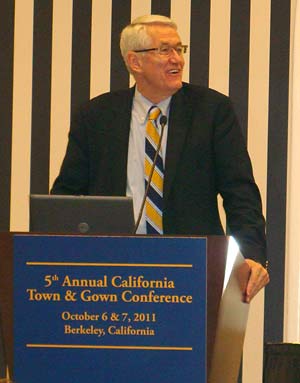Campus, city host meeting of minds in downtown Berkeley
At the fifth annual Town and Gown Conference, officials from government, education and business — including UC Berkeley's Robert Birgeneau and Robert Reich, Berkeley Mayor Tom Bates and Lt. Gov. Gavin Newsom — focus on "Working Together in Tough Times."
October 7, 2011
Though he acknowledged “some bumps along the road” during a Friday breakfast session, Berkeley Mayor Tom Bates praised UC Berkeley’s contributions to the local economy and declared himself “extraordinarily proud” of his city’s increasingly close partnership with the campus. Seated beside him on the dais was Berkeley Chancellor Robert Birgeneau, who seemed no less eager to put bygones behind him and focus on the journey ahead.

Chancellor Birgeneau opens the conference on Thursday morning
Bates and Birgeneau were among the officials representing “town” and “gown” at the fifth annual Town and Gown Conference, a two-day meeting of minds from the fields of government, education and business in the ballroom of downtown Berkeley’s Hotel Shattuck Plaza. Day 1, on Thursday, featured keynotes by Lt. Gov. Gavin Newsom, the former San Francisco mayor and current UC regent, and author and climate-change activist Mark Hertsgaard. Highlights of Friday’s session were a panel discussion anchored by Bates and Birgeneau, and a talk by former Labor Secretary Robert Reich, an economist and professor of public policy at Berkeley.
This year’s theme was “Working Together in Tough Times,” and the participants — including, on Friday’s panel, San Francisco State University President Robert Corrigan and Palo Alto Mayor Sid Espinosa, who compared and contrasted their own respective town-gown relationships — appeared to be all in.
Reich, describing the state of the U.S. economy as “a jobs depression,” sounded what might have been the clarion call of the conference, insisting that in tough economic times, government is “the consumer of last resort,” and that education, like infrastructure, is “a clear example of a public investment.”
“This is not a zero-sum game,” Reich told an attentive crowd, calling on Washington to do more to create jobs and pull the country out of a recession he said was “not a double dip,” but “the first dip.”
“This is a time,” Reich said, “when we need to stop whining and start coming together.”
Newsom, noting the correlation between the state’s once-robust job growth and the health of its public-education system, said that “the conveyer belt of our higher-education system in California is not moving.”
“Research universities like UC Berkeley spawn new products, technologies and new industries that benefit every Californian,” Newsom said. “The University of California has not only helped build new industries in this state, it supplies the educated workforce these industries depend on to compete in the global economy.
“What took 100 years to develop can be taken down in only a few years of neglect,” he added. “We’ve got to become more competitive and get back into the business of job creation.”
Birgeneau picked up the theme on Friday, citing the millions of dollars the campus and Lawrence Berkeley Lab contribute to the local economy and calling on legislators to “make sure that jobs stay in the East Bay.”
Birgeneau noted that when he took over as Berkeley’s chancellor in 2004, the now-void compact between UC and Gov. Arnold Schwarzenegger would have meant $600 million in state funds for the campus this year. Instead, under Jerry Brown, UC Berkeley will receive just $220 million after the additional budget cuts “the governor has assured me will come.”
That, added the chancellor, is exactly the wrong direction for the state. Instead of cutbacks, he declared, “we have to start investing again in higher education.”